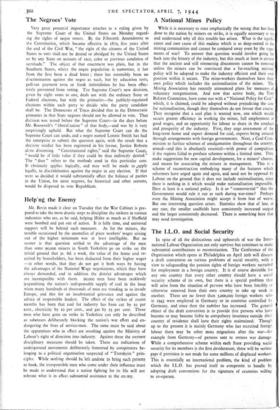A National Mines Policy
While it is necessary to state emphatically the wrong that has been done to the nation by miners on strike, it is equally necessary to try and understand why all this trouble has arisen. What is the signifi- cance and root cause of this malaise which is so deep-seated in the mining communities and cannot be conjured away even by the argu- ments of war? To answer that question would involve going far back into the history of the industry, but this much, at least is certain that the ancient and still simmering discontents cannot be removed unless the miners can be convinced that a far-reaching national policy will be adopted to make the industry efficient and their own position within it secure. The mine-workers themselves have their own policy which includes the nationalisation of the mines. The Mining Association has recently announced plans for measures of voluntary reorganisation. And now that active body, the Tory Reform Committee, have come out with a "National Policy for Coal" which, it is claimed, could be adopted without prejudicing the case for nationalisation, though they themselves do not favour that course. They recognise that a coal plan is wanted now, one which would secure greater efficiency in working the mines, full employment at good wages, and an opportunity for labour to share in the conduct and prosperity of the industry. First, they urge assessment of the long-term home and export demand for 'coal, exports being assured through arrangements with foreign governments. Next, a Coal Com- mission to further schemes of amalgamation throughout the country, armed—and this is absolutely essential—with power of compulsion if the regions failed to produce schemes within a limited time. They make suggestions for new capital development, for a miners' charter, and means for associating the miners in management. This is a scheme of reconstruction embodying many of the features which reformers have urged again and again, and need not be opposed by Labour on the ground that it does not include nationalisation, since there is nothing in it, which would make nationalisation iMpossible. Here at least is a national policy. Is it so " controversial " that the Government would rule it out as such during war-time? Perhaps even the Mining Association might accept it from fear of worse. But one interesting question arises. Statistics show that of late, at any rate, the smaller coalfields have consistently increased output and the larger consistently decreased. There is something here that may need investigation.


























 Previous page
Previous page